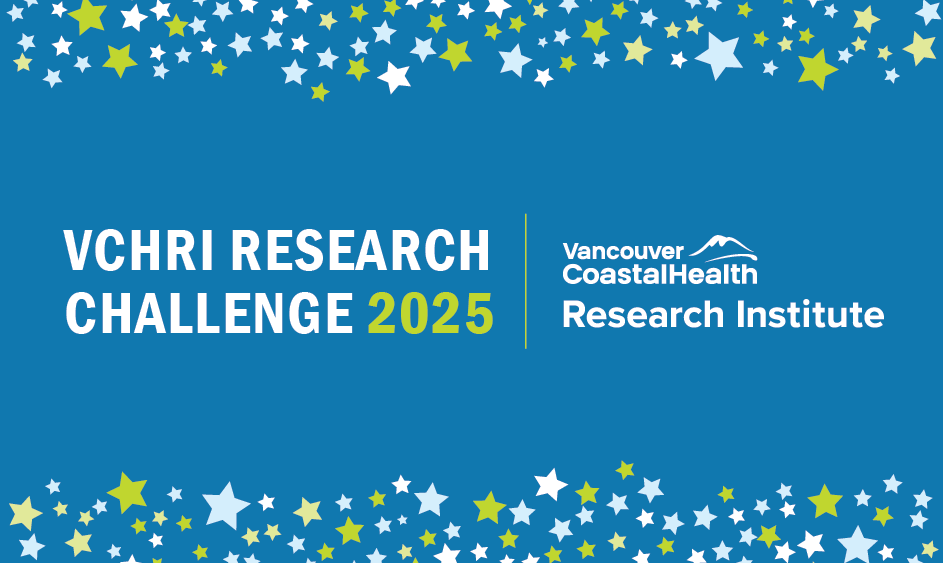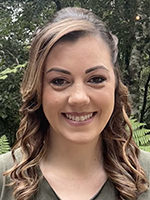
Congratulations to this year’s recipients of the Vancouver Coastal Health Research Institute Research Challenge.
The Vancouver Coastal Health Research Institute (VCHRI) Research Challenge supports Vancouver Coastal Health (VCH) point-of-care staff with limited research experience in creating a project to improve practice areas. Recipients receive mentorship by an experienced VCHRI investigator in addition to funding to help them learn to successfully conduct a clinical research project.
The 2025 VCHRI Research Challenge recipients are:
- Bahar Ahmadi, registered nurse, Emergency Department, Lions Gate Hospital (LGH)
- Dr. Fay Leung, physician, Department of Surgery, Richmond Hospital
- Claire Meggs, clinical mentor, Emergency Department, Vancouver General Hospital (VGH)
- Angela White, clinical resource educator, physiotherapy, VCH
Enhancing urgent care training for emergency department nurses at VCH

Project title: Exploring the experiences of new emergency nurses working in intake at LGH Emergency Department

This study explores the experiences of newly trained emergency nurses working in the intake care space of Lions Gate Hospital’s Emergency Department (ED). Intake is a fast-paced area where small teams of nurses manage and care for large numbers of patients at once — a model that differs significantly from the traditional one-on-one nurse-patient care structure emphasized in most training programs.
Led by registered nurse Bahar Ahmadi and mentored by Dr. Nassim Adhami, this qualitative study will gather insights from new nurses about the challenges they encounter when transitioning into the intake role, including workflow management, clinical decision-making and stress management. The findings will help inform future improvements to training, mentorship and workplace support for emergency nurses working in intake settings, with the goal of enhancing both staff well-being and patient care.
“This study is an opportunity to build better onboarding and support systems that boost nurse confidence, reduce burnout and ultimately enhance patient care across VCH,” says Ahmadi.
“Supporting new nurses as they transition into complex care environments is essential to strengthening our health care system,” says Adhami. “I’m proud to mentor Bahar for this meaningful project that will have a direct impact on improving care delivery and the workplace culture in emergency departments.”
Improving communication to reduce anxiety among patients with musculoskeletal issues

Project title: Psychological effects of MRI terminology

Medical imaging offers valuable insights for patients with musculoskeletal conditions. However, magnetic resonance imaging (MRI) reports may contain complex or alarming terminology that can be a source of unnecessary anxiety for some patients. Patient distress may be particularly pronounced in circumstances in which patients must wait to speak with a care provider about the details of their MRI report, or for a diagnosis or treatment plan.
A new study led by Dr. Fay Leung and mentored by Dr. Bonita Sawatzky is exploring how the language used in MRI reports affects patients’ emotions, perceived disability and expectations around treatment, surgery and recovery. The goal of the study is to improve how clinicians communicate with patients before, during and after an MRI scan to ensure that care is patient-centered, accessible and respectful.
“By improving how we communicate complex information with patients, we can be in a better position to reduce the odds of eliciting fear and build a stronger partnership between patients and providers,” says Leung. “This will help patients feel less anxious, more informed and more confident as they navigate their care journey.”
“This project aims to transform how we support patients emotionally as well as medically through every step of their journey,” adds Sawatsky. “Clear and compassionate communication is one of the most powerful tools that we have available to us in health care.”
Developing novel monitoring protocols to support the emergency care of patients with opioid toxicity

Project title: CO₂-MED: Capnography Observation for Opioid Monitoring in Emergency Departments

Shallow and/or slow breathing, known as respiratory depression, may not be caught early when patients with opioid toxicity are assessed in unmonitored emergency department areas. Continuous capnography — a method that tracks patients’ breathing — is recognized as the best practice for safely monitoring patient respiratory status and reducing the occurrence of adverse respiratory events in places like operating rooms. However, this effective approach is not routinely used in emergency departments for this purpose.
The research project led by Claire Meggs and mentored by Dr. Jessica Moe will assess the feasibility and acceptability for both patients and health care providers of a model to use continuous capnography to monitor people following opioid toxicity. Patient participants included in the study will be individuals over 18 years of age who have presented to the emergency department following toxicity from unregulated opioid use. Researchers will review the care of study participants and administer surveys to collect feedback from both study participants and their care providers. The research team will use feedback and other quantitative data to make recommendations to refine and better integrate continuous capnography into emergency care.
“Continuous capnography has the potential to transform how we monitor patients with opioid toxicity,” says Meggs. “This study will help us understand how practical and acceptable this monitoring method is in a busy emergency department environment.”
“This project highlights a critical step toward safer care for patients affected by the opioid crisis,” says Moe. “It also showcases how innovation in monitoring technology can save lives in emergency settings.”
Home health physiotherapy intervention to enhance access for older adults

Project title: Enhancing workforce capacity: Exploring the integration of physiotherapy assistants in home health at Vancouver Coastal Health, a qualitative study

With the rising demand for home health services, optimizing the role of physiotherapy assistants (PTAs) is essential to improving care delivery and patient outcomes. Previous research suggests that PTAs can enhance physiotherapy services, which in turn allows physiotherapists to focus on more complex tasks. However, there is limited evidence regarding the integration of PTAs in the context of home health physiotherapy.
This study explores how physiotherapists at VCH are integrating PTAs into their practice, identifying barriers and facilitators to effective collaboration. Using focus groups and documentation audits with physiotherapists and PTAs in Vancouver and Richmond, findings from this study will help guide strategies like education and workflow improvements to enhance teamwork, role clarity and patient outcomes.
“Optimizing PTA roles in home health can greatly improve access and quality of care for our aging population,” says White. “Our research will help to identify practical ways to strengthen collaborative opportunities between physiotherapists and PTAs.”
“This research supports B.C.’s strategic goals to maximize the potential of allied health providers, such as physiotherapists, and improve care for seniors,” says Dr. Moecke. “By addressing integration challenges, we can improve our home health system.”
Research Challenge Awards are made possible with the generous support of VGH & UBC Hospital Foundation, Richmond Hospital Foundation, Lions Gate Hospital Foundation, in partnership with VCHRI.


